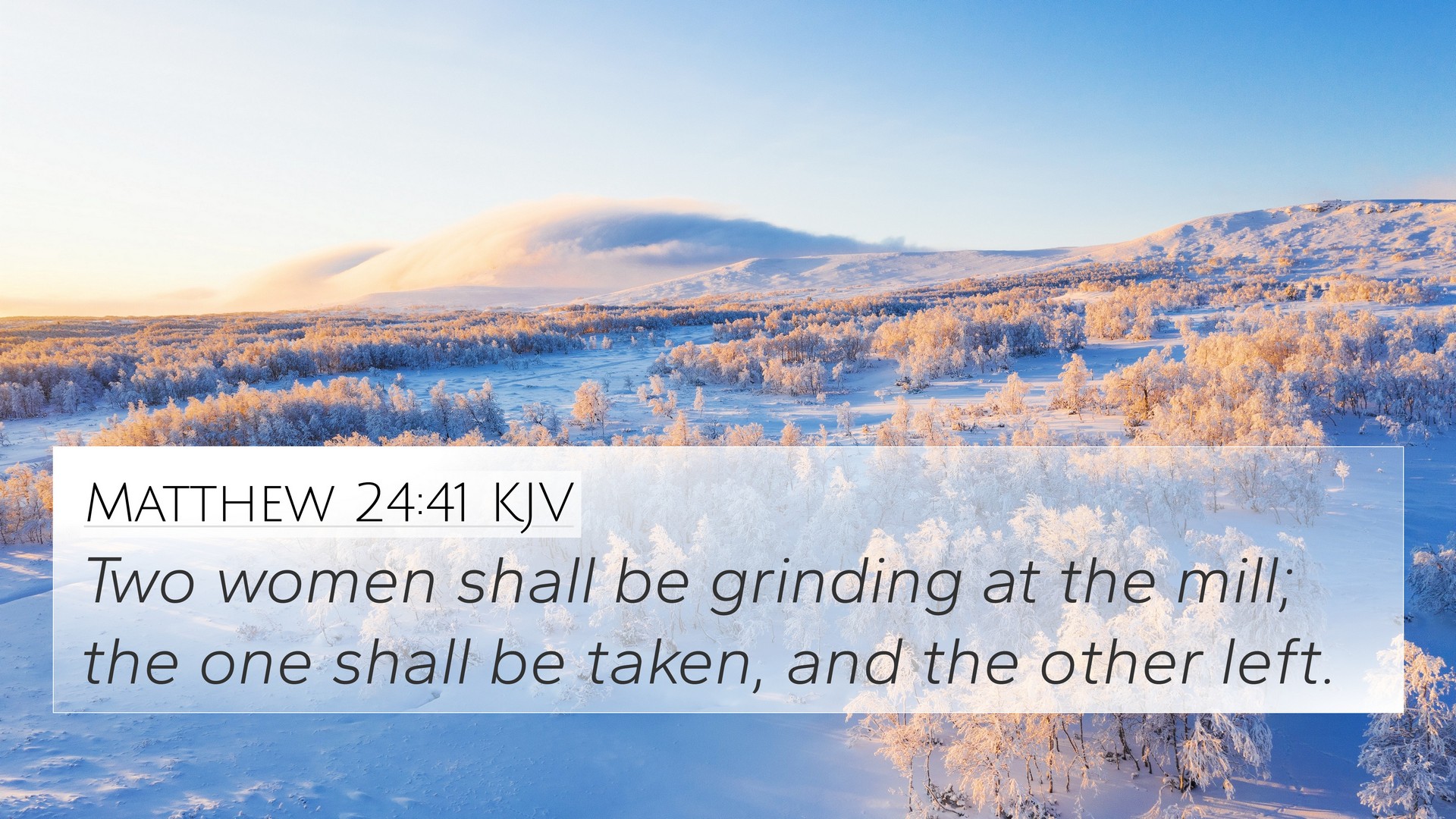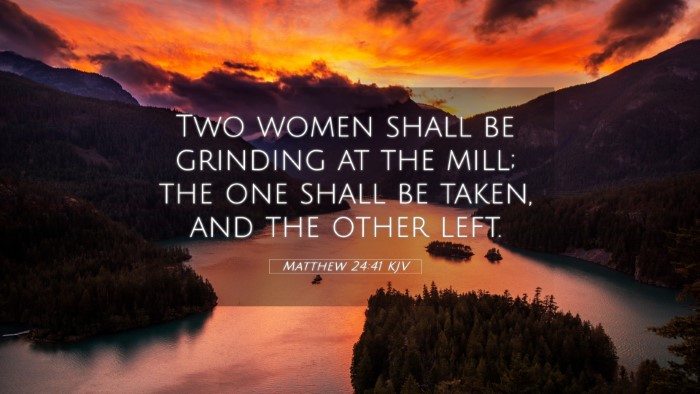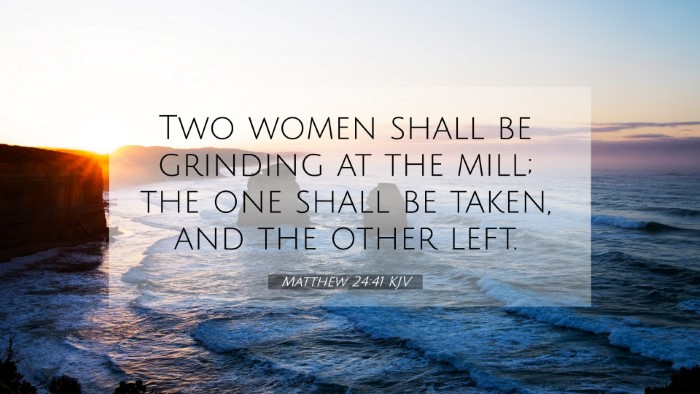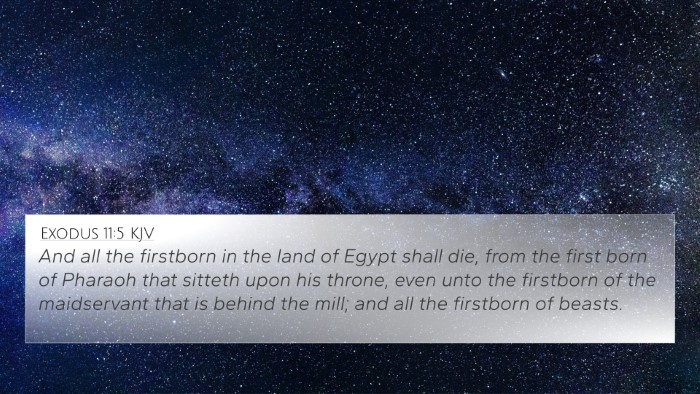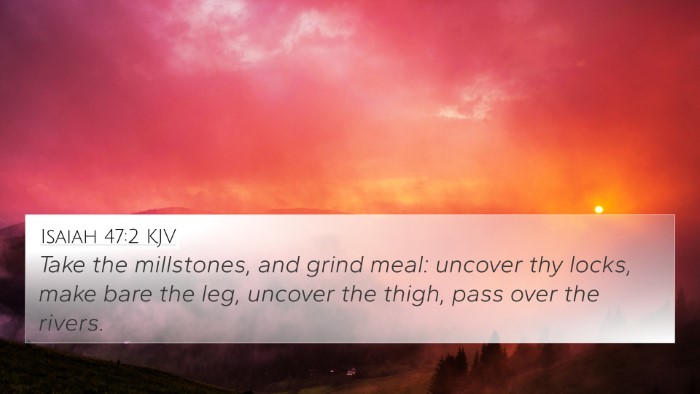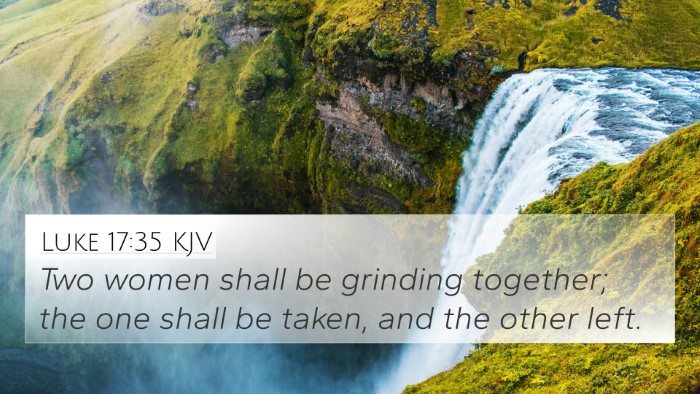Understanding Matthew 24:41
Bible Verse: “Two women will be grinding at the mill; one will be taken and the other left.” - Matthew 24:41
Verse Meaning Summary
This verse is part of a larger passage where Jesus speaks about the end times and His second coming. Matthew 24:41 illustrates the suddenness of judgment and the separation that will occur among people. The setting of two women performing a common task, grinding at the mill, highlights the ordinary nature of life at the time of Christ’s return.
Key Themes:
- Suddenness of Judgment: The verse emphasizes the unexpected nature of the day of the Lord.
- Separation: The imagery of one woman being taken and the other left signifies the distinction between those who are prepared and those who are not.
- Everyday Life: The normal activity of grinding grain serves as a reminder that life continues until the Lord returns.
Commentary Insights
Matthew Henry: He emphasizes the nature of the events Jesus describes, teaching that at the coming of the Son of Man, there will be an unexpected and sudden separation. The reference to women grinding at the mill illustrates that Jesus’ return will not depend on what people are actively doing; it will transcend everyday life.
Albert Barnes: Barnes points out that the two women represent two classes of people—believers and non-believers. The verse indicates that proximity and shared experiences do not guarantee one's selection during the final judgment.
Adam Clarke: Clarke reflects on the Jewish culture of grinding, noting that it was a common task shared by women, leading to the notion of how life proceeds with mundane activities even when significant spiritual truths overshadow them. He also discusses the implications of being "taken" or "left," suggesting considerations of readiness and spiritual vigilance.
Connections with Other Bible Verses
Matthew 24:41 intersects significantly with various other scriptures, making it a pivotal verse for those engaging in Bible verse cross-references:
- Luke 17:34-36: Similar imagery of two people working; one taken, the other left.
- 1 Thessalonians 5:2-3: The unexpected nature of the Lord's return compared to laboring men’s plans.
- Matthew 25:1-13: The parable of the ten virgins stresses readiness and separation based on preparedness.
- John 10:14-15: The concept of the Good Shepherd knowing His own and the distinction from others.
- Revelation 3:10: The promise to keep the faithful from trial, suggesting protection for those “taken.”
- Matthew 13:30: The separation of wheat and tares at the harvest serves as a metaphor for final judgment.
- Philippians 3:20: Encouragement regarding citizenship in heaven strengthens the theme of divine selective judgment.
Thematic Bible Verse Connections
This verse appears amidst a conversation on apocalyptic themes and can be compared with others that share similar subjects:
- Isaiah 26:20-21: The call for the faithful to hide as God’s judgment comes upon the earth.
- 2 Peter 3:10: Promises that the day of the Lord will come as a thief in the night, correlating to the unexpected nature of events described in Matthew 24.
Utilizing Cross-References for Deeper Understanding
Engaging in Bible cross-reference study is a tool that allows one to delve deeper into the meanings derived from Scriptures. It aids in drawing connections to the overarching themes of judgment, preparedness, and the unpredictability of God’s timing.
Resources for bible cross-referencing include:
- Comprehensive Bible concordances.
- Bible reference resources available online or in print.
- Chain reference systems in Bible study guides.
Conclusion
Matthew 24:41 serves as a sobering reminder of the inevitability of divine judgment and the importance of readiness. The metaphoric language serves to connect this verse with many other scripture passages, enriching one’s understanding of Biblical themes. By utilizing tools for Bible cross-referencing, believers can uncover deeper insights regarding the teachings found within Holy Scripture.
